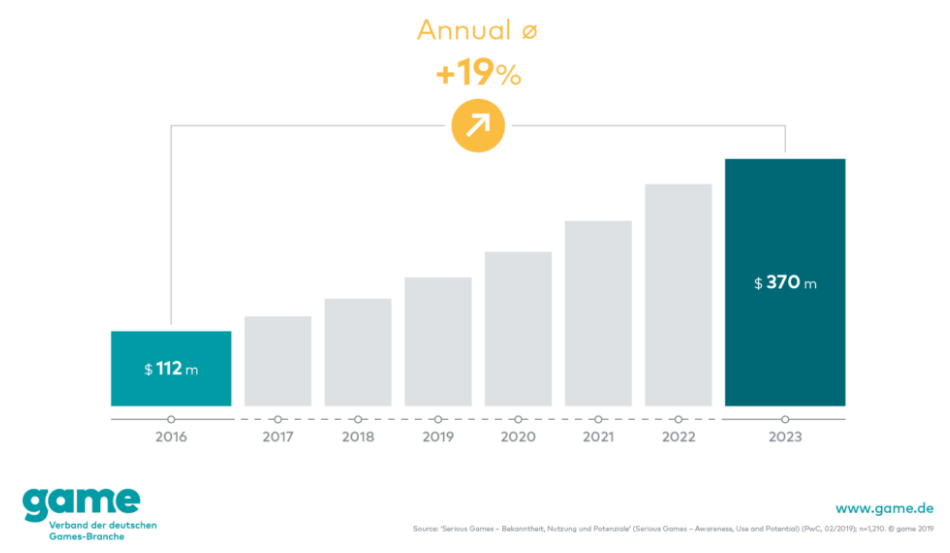Training and Careers in a Creative Field
Germany as a Games Hub

Games are a key medium of the twenty-first century and as such are increasingly becoming the focus of public interest. Over the past twenty years, the perception of games in Germany’s social discourse has improved; new releases are now discussed in the arts pages of newspapers, just as games are taking up and addressing structures and debates from society.
By Annegret Montag
It’s not surprising that digital games in the form of serious games, apps, and games from the entertainment sector have found their way into many areas of society and that the demand for training and career options has increased.
ANNUAL TURNOVER WITH GAMES IS INCREASING: THE IMPORTANCE OF SERIOUS GAMES FOR THE GERMAN MARKET IS GROWING
As for Germany as a business location, many medium-sized companies in the serious and mobile games segments of the industry have settled here. Companies from the entertainment sector can also be found in Germany, but these are in the minority. Geographically, the business locations are spread all over Germany, but most of them are in the major cities: Berlin, Hamburg, and Frankfurt am Main.Through the Darkest of Times is an example of a particularly successful serious game produced in Germany with a focus on historical knowledge. Historical facts about the Nazi era and the resistance against it are conveyed in the game.
This will therefore be the sector with the highest development potential on the market for the next few years. In particular, the games funding resolved by the Federal Ministry of Transport and Digital Infrastructure in 2018 aims to give studios in Germany the opportunity to produce their own games and to make themselves and Germany internationally competitive. The export quota of German game productions is presently 49 per cent. The games funding increases optimism that Germany may follow the example of the Canadian games industry, that developer studios will set up businesses, and that the games industry in Germany will grow even more.
DId you know?
According to "game - The German Games Industry Association" - 34.3 million people in Germany play computer and video games.
New educational pathways
Those who want to work in the gaming sector in Germany have a variety of options.
State and Private Educational Institutions
First of all, many educational institutions in Germany – both state and private – offer opportunities to pursue training paths for the respective professions. Training as a computer scientist or programmer is certainly the best-known profession, but game – The German Games Industry Association defines 12 more different career profiles:
- Game Designer
- Game Producer
- Product Manager
- Writer / Storyteller
- Graphic Designer
- Level- / Content Designer
- Technical Artist
- Programmer
- Composer
- Sound- / FX Designer
- Localisation Manager
- QA Manager
- Community Manager
When selecting courses of study, it is worth researching the respective websites of the educational institutions to find out which focuses are set in the training. Considerations should focus on one’s own interests; for instance, Fachhochschulen or Universities of Applied Sciences offer a much more practical training path than universities. Those who start studying German at a university will rarely find games as an object of consideration. For this reason, it is worth making a targeted comparison here.
In addition to training at a university, there are also opportunities to begin training as an IT specialist or in the field of game design at a company or at a vocational school. The industry is very fond of such practical training and often values hands-on work more than years of study.
Career changers wanted!
Career changers from abroad are also very welcome, as the German games industry works with diverse and above all with international teams.
Annegret Montag
A recently published study by the game association reveals that the proportion of employees without German citizenship, 27 per cent, is vast in comparison with other cultural industries and can be explained by an increased need for highly qualified specialists from abroad. For these highly qualified specialists, mostly from the IT sector, companies also pay significantly higher starting salaries and the companies ensure a smooth entry and take care of many formalities with authorities.
In addition, a job with a German company is also worthwhile from the point of view of the associated employee benefits. For example, health insurance is required by law in employment relationships. A look at the employment figures also shows that 80 per cent of employees have permanent contracts and make social security contributions.
Anyone interested in a job in the games industry and enthusiastic about the work should simply apply. The industry is always looking for creative and clever people!




Comments
Comment